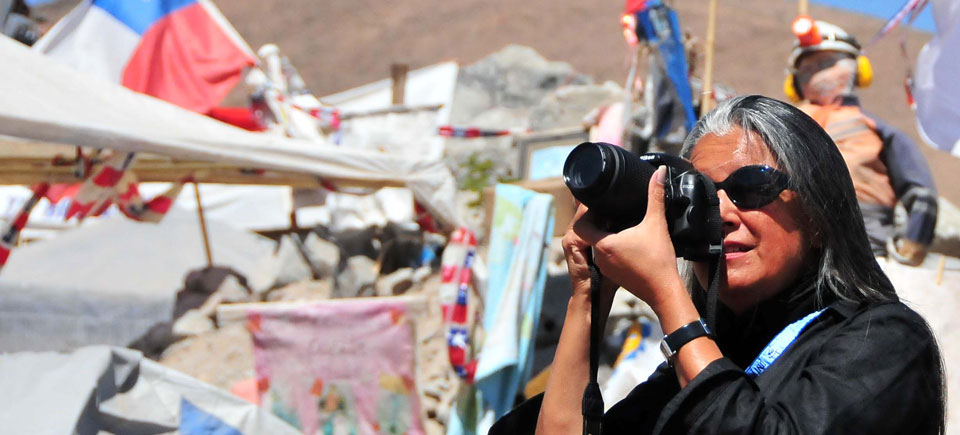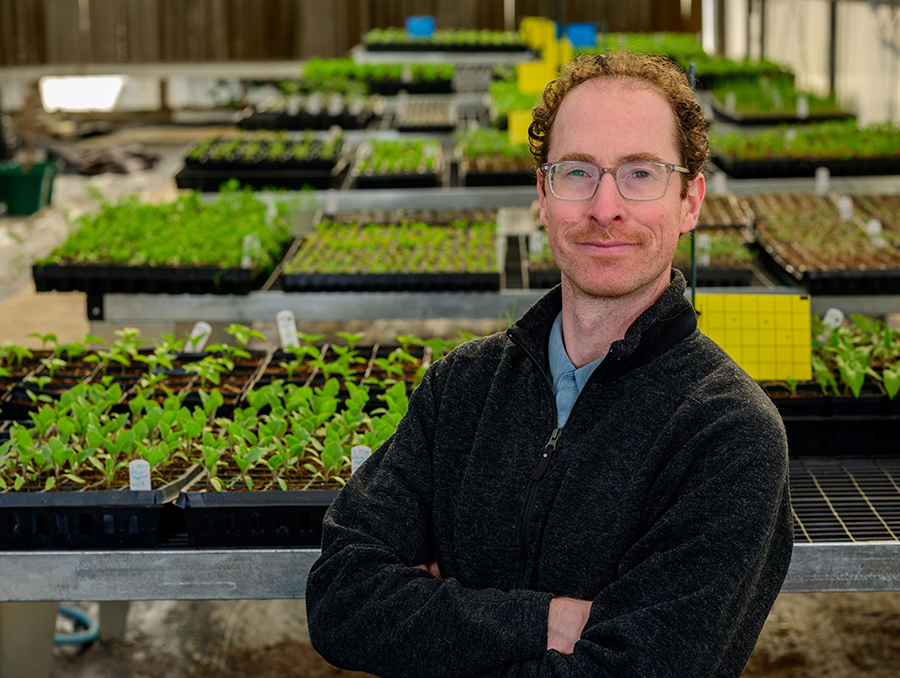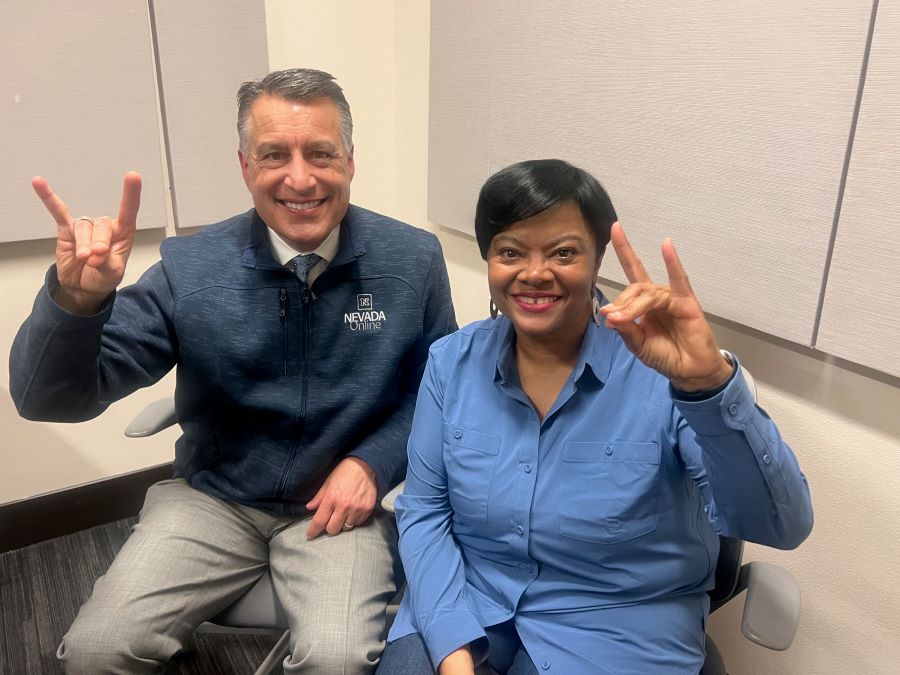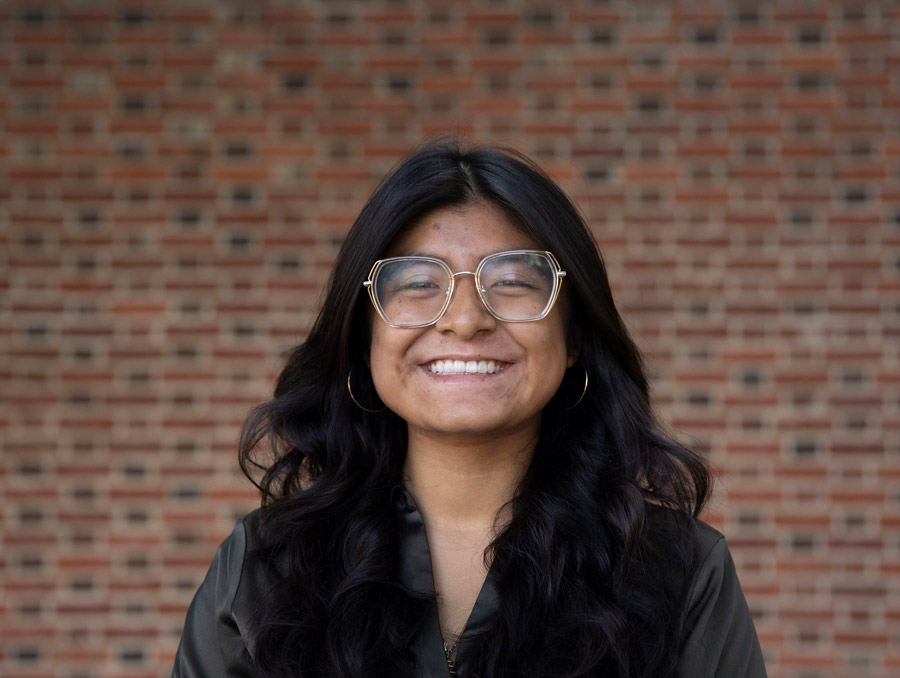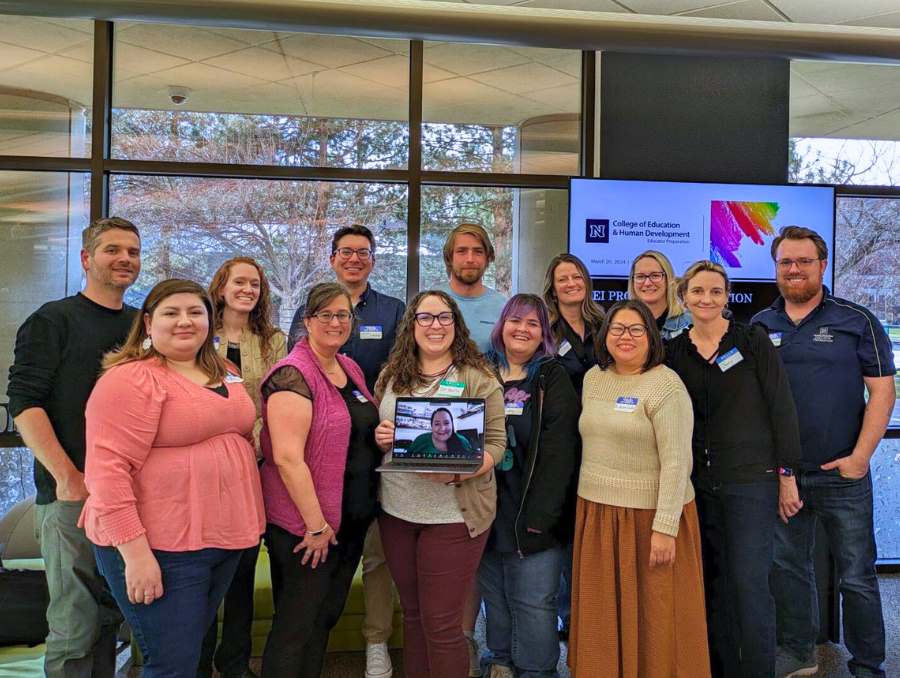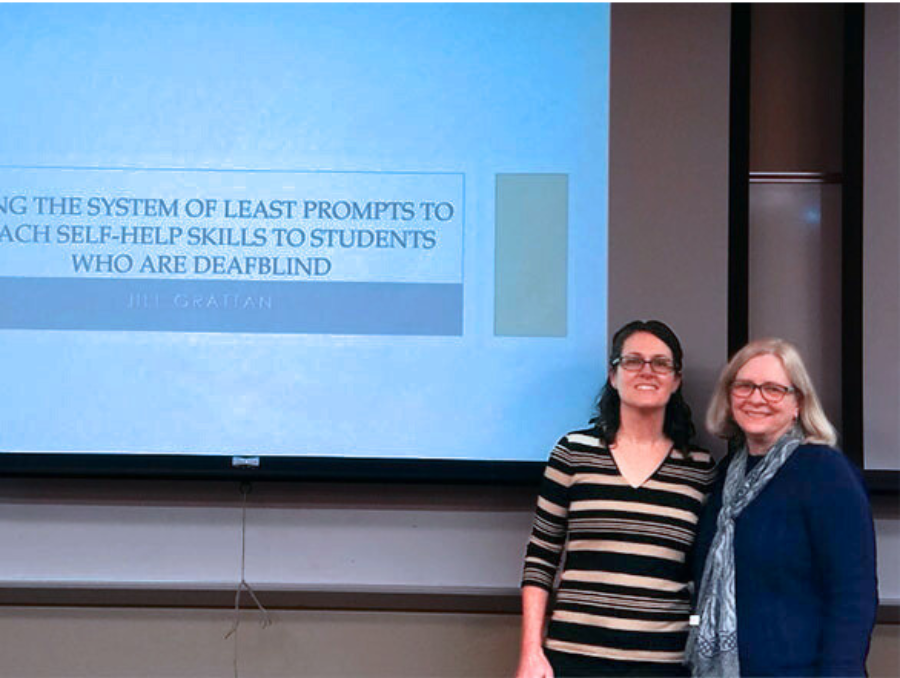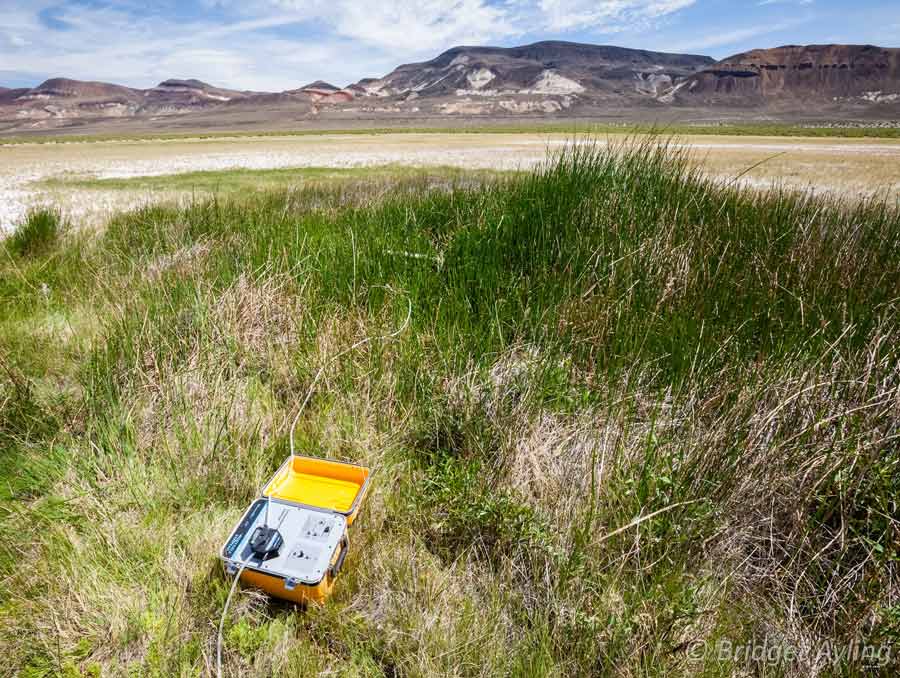Of all the memories and moments from the whirlwind events of a year ago, when Emma Sepulveda traveled to Chile to bear witness to one of the world’s most improbable rescue efforts, one stands out more than others.
Sepulveda was grabbed almost immediately by the drama of the situation. Thirty-three miners, buried alive nearly a half mile below ground, in the middle of a desert in Copiapo, Chile, surrounded by what would become a camp of tense, grieving family members and hordes of media from throughout the world.
And yet, “nobody was talking about the impact on the families, how they were struggling to make it every day,” said Sepulveda, a longtime University of Nevada, Reno professor and internationally recognized writer and human rights activist. “The only way to help, to help tell their story, was to go there and immerse myself in what they were experiencing.”
Sepulveda met every type of family member imaginable, as the drama unfolded over 69 days before all 33 men were successfully rescued on Oct. 14, 2010.
One family member, in particular, was especially hard to forget.
Sepulveda still remembers the eyes.
They were dark, mournful eyes, and they belonged to a young woman whose father, Mario, was one of the trapped miners.
Months later, Sepulveda can still picture the young woman’s eyes in her mind, and how despondent they seemed. How they were like hands pleading for an embrace, how they reached out to Sepulveda in a way she had never before experienced.
How dark and alone the eyes of the young woman looked, not unlike the terrible space where 33 men would be trapped for more than two months.
“I had never seen such sad eyes,” Sepulveda remembered from the first time she met the young woman, whose name was Scarlette Sepulveda. “Her eyes were just so sad.”
Sepulveda saw more than sadness, however.
If the young woman’s 18-year-old eyes were a sad reflection of the events of the moment, Sepulveda could also sense there was more. That like a piece of art, like a painting, the eyes possessed the potential for light to come from darkness, for tragedy to turn into renewal.
“Scarlette reminded me a lot of when I was young,” said Sepulveda, who was born in Argentina, migrated to Chile and moved to the United States in the early 1970s. During her career at the University of Nevada, Reno, Sepulveda has been a trailblazer. She’s the first Latina to become a full professor at the University, and has authored or co-authored more than 20 books. She is a Nevada Writer’s Hall of Fame inductee, and a recipient of the prestigious Mujer Award from the National Hispanic Leadership Institute. “It was a sad moment when we first met. Nobody knew 100 percent if Scarlette’s father and the rest of the miners were going to come up.
“Scarlette had said her dad and family would never be the same, that this was something that marked them forever.”
Less than a year later, Scarlette Sepulveda sits about an arm’s length from Emma Sepulveda, in the elder Sepulveda’s Latino Research Center office in the bowels of Edmund Cain Hall on the University of Nevada, Reno campus. (Emma and Scarlette Sepulveda, though they share the same last name, are not related.)
It is September, and classes have been going for only a few weeks. With Emma Sepulveda’s guidance and support, Scarlette Sepulveda has come to Reno to pursue her dream: a college education. Scarlette was preparing for the Chilean equivalent last year when everything in her life came to a sudden, terrible halt with the cave-in.
During the uncertain days that soon grew into weeks of waiting, Emma and Scarlette’s friendship grew. The young woman gave the visitor water and fruit. The visitor soon became a spokesperson for the families, feeling duty-bound to protect their interests and to ensure that their story was told with compassion and accuracy.
“When I met her it was like an instant thing,” Scarlette said of her relationship with Emma. “I liked her right away. There had been so many other people at the camp, it was impossible to trust. But I trusted ‘Tia’ Emma immediately.”
“That’s what she calls me, almost from the beginning,” Emma said softly, repeating ‘Tia,’ Spanish for “aunt.”
Emma Sepulveda made Scarlette a simple promise, one that, as she thought about it, probably sounded rather hollow to the young woman, who was barraged on almost a daily basis with misinformation regarding the status of her father.
“One day Scarlette,” Emma told her young friend, “I will be able to help you as you have helped me.”
“And,” Emma recalled, with a knowing shrug, “Scarlette probably thought, ‘This lady will probably go back to the United States and I will never see her again.’”
Emma’s eyes told a different story, though. This was a woman who has always been fiercely loyal to those close to her, a woman who has always encouraged others to seek and aspire to do more.
Emma could not easily forget Scarlette’s eyes, and Scarlette soon found that there was good reason for the trust she had felt when she had looked into Emma’s.
At first, in the days following the rescue, a few tentative emails were sent and received. Then, Sepulveda’s book which chronicled the event, “Seventy Days of Night, 33 Miners Trapped: The Story of a Hidden Rescue,” was dedicated to, among others, young Scarlette.
The gesture surprised Scarlette.
Soon, arrangements were being made, travel itineraries finalized, scholarship money from organizations such as the Reno Rotary Club were gathered, arrangements for intensive English language courses were arranged.
Since arriving in Reno this summer, Scarlette has been a hard-working addition to Emma’s home.
“She’s been unbelievable,” Emma said. “I’m so impressed with how motivated and hard-working she is. She’s up at 5:30 every morning. She studies every night, including Sunday. She doesn’t do anything but take classes and study. She is one of the most motivated and focused students I’ve ever seen.”
“My goal,” said Scarlette, through Emma’s translation, “is to get an education and return to Chile and help others.”
She is hoping to eventually major in journalism or theater, with an emphasis in broadcast journalism.
“She was very taken by the media that covered the story for two months,” Emma said.
“I’m interested in learning about the steps media takes in covering stories like the one involving my father,” Scarlette said. “I’m interested in how people report tragedies, and how they deal with the people whose lives are affected by tragedies.”
Scarlette was impressed by the power of the media, how journalists, through non-stop coverage, were able to keep popular pressure on the Chilean government not to abandon the rescue effort.
“She had never realized how powerful journalism can be,” Emma said.
While the transition to a new country, a new university, and a new opportunity, has been relatively seamless, Scarlette admitted that her father has had his share of challenges since emerging from the darkness last fall.
Although he and the other survivors were welcomed as heroes and were treated like celebrities in the months following the rescue, it has been difficult for Mario Sepulveda. During meals, he often can only sit for three or four minutes at a time before he becomes restless, nervous, and gets up and walks away from the table, Emma said.
“Scarlette immediately realized as soon as he came out of the capsule, that he was not the same man,” Emma said. “He has an incredible fear of closed spaces, and a high degree of anxiety.”
“I was extremely happy that my father was alive … I don’t discount that,” Scarlette said. “But he is a changed man. In the back of my mind, I always think that such an incredible event has determined the life of my father.”
Emma has been impressed with the ease that Scarlette has adjusted to her new life in America.
“She doesn’t act like a celebrity at all,” Emma said. “She’s friends with the Japanese, the Indian, the Costa Rican students who are also in the intensive English language program.”
“I feel like I have a very normal life,” Scarlette added. “I get up every morning and study just like any other student. If I’ve learned one thing, it’s to live day by day and to live every day like it’s your last. You need to live every day like it could be the last one you ever have.
“And, the most important thing in life is … treasure the people in your life.”
For a moment, Scarlette paused, and looked across the table at Emma.
“Don’t leave in the morning without saying ‘I love you,’” Scarlette said. “You never know.”
You never know.
The dark eyes, in a year’s time, were still unmistakable.
Only this time, there was no darkness.
There was no sadness.
Only light.
